The Darker Corners of Pinocchio
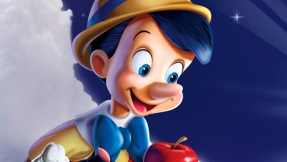
Walt Disney is known for making high-grossing animated movies before and after the death of its founder Walt Disney himself. Usually, there is something to be seen in many Disney movies ranging from the 1930’s to the 1990’s. Some of them were darker than others with Hunchback of Notre Dame usually taking the cake, some even putting Black Cauldron and Sleeping Beauty up on that special pedestal. However, one Disney movie sets itself apart from the rest. It took enough liberties with their storytelling to an extent that even the artists behind the Hunchback of Notre Dame did not dare to attempt. No Disney movie dared to attempt what Pinocchio did. Pinocchio is probably the darkest of all Disney films.
Pinocchio is known, far and wide as the puppet who strived to become a boy, who learned to live up to the qualities required of a real boy: to be ‘brave, truthful and unselfish.’ His quest is the primary plot with deviations and digressions, telling the story so realistically it puts modern kids to shame. What is the first thing that comes to mind about Pinocchio? ‘Don’t lie’ or something along those lines, perhaps his status as a puppet, and it is a shame because there is so much more to that movie. That movie, for its lesson, tells a whole pack of truths to an extent it hurts. The truth hurts, especially when it is implicit. In Pinocchio, the truth does hurt and partly because its messages are not implicit at all. In some cases, they are in the open.
To see this, every last truth, lie, lesson, virtue and villain Pinocchio has to offer must be examined. When the movie starts, it begins with the famous When you Wish Upon a Star sequence and skip to Gepetto finishing his latest wooden creation. This creation is a puppet he names Pinocchio. But the man who lives alone with his cat and goldfish has the craziest wish ever. He wishes that his puppet would come to life. The wish is granted by none other than our basic deus ex machina, the Blue Fairy. She decides that Gepetto deserves to have his wish granted, and gives Pinocchio the gift of life. However, this is as far as she goes before laying the burden on Pinocchio to prove himself before being made of flesh and blood. This is what leads us to the first lie of the movie and ironically it is not told by Pinocchio.
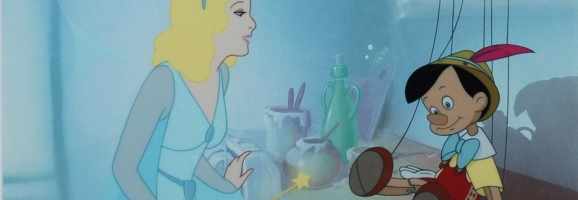
“Prove yourself brave, truthful and unselfish, and someday you will be a real boy.”
“And always let your conscience be your guide.”
And our favorite little cricket, Jiminy explains in eloquent words…
“that still small voice that people won’t listen. That’s just the trouble with the world today.”
These lines hold, from the beginning till the end as the most important and oft-spoken lines in the movie. And these lines are lies. Not in the conventional sense but lies nonetheless, lies in the sense that the Blue Fairy tells Pinocchio to prove himself in ways no other person in the movie could. What was it Jiminy said about a conscience? People do not listen to their conscience, the vast majority of humans in the movie are terrible, even kids Pinocchio’s own age go astray, and Pinocchio is nonetheless asked to become the lone light in a sea of darkness. The Blue Fairy gives Pinocchio what is basically to be seen as the model for a live human being, which is a lie. No human in the movie acts like this so it must be assumed that the Blue Fairy wants Pinocchio to be that model. In other words, Pinocchio must complete a task which is perhaps more impossible than any protagonist has ever had to complete in a Disney movie.
Is it impossible that a Prince armed with a sword and shield and backed by three fairies can defeat a dragon? Is it impossible that seven angry dwarves can defeat an old witch who unfortunately lacks her usual Potions? Is it impossible that a street rat can trick a mad sorcerer into becoming a genie by taking advantage of his pride? Last but not least, is it impossible that Paris successfully revolts against a crazed judge who decided to bring the fight to their most precious cathedral in the square? In Pinocchio, it only gets harder.
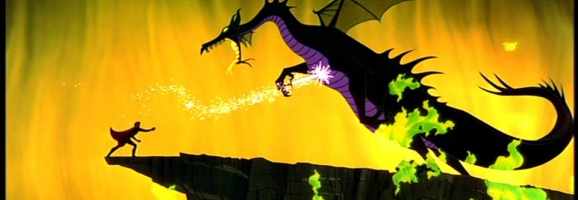
The rest of the lies are told by Pinocchio. Or are they? Pinocchio has every intention of going to school. In fact, he is well on his way until the first two villains we meet take him away and convince him to become an actor in the theater. He is lured away by Mr. Honest John Foulfellow whose very name screams of irony. Pinocchio is an instant success in the theater to such an extent, Jiminy Cricket starts to doubt himself. Perhaps Jiminy was wrong. The temptations the fairy warned against seem to be affecting even our guide. But when the Puppet master Stromboli locks Pinocchio in, Jiminy pops in to help and the wooden puppet realizes where he went wrong. This, in that sense represents the very first lesson we are taught with another coming shortly. Acting is not a distinguished career no matter how much press they get. They get used, abused and thrown away and Pinocchio was no different. He is locked, the cage is rusted, and Jiminy is incapable of helping.
Enter: The Blue Fairy for the second time. Her first action was giving Pinocchio life, now she meets him again for another talk, another lesson, and some last bit of magic. She asks him why he did not go to school and Pinocchio starts with the truth.
“I was going to school till I met somebody.”
Unfortunately, his nose starts growing as he continues to emphasize that he met two monsters. This was perceived as a lie, of course but the audience knows better. Was it really a lie? Was Honest John not a monster? Was Stromboli just being innocent? Was John’s sidekick just there? Many could very well perceive those two characters (three counting the sidekick fox) as monsters, making Pinocchio’s first words a truth. As the movie portrays it as a lie, here again is the second lie told by either the movie or Pinocchio himself, depending on how it is spun.
It does not end there either. The Blue Fairy plays along and questions Pinocchio as to whether he was afraid. Pinocchio insists he was not afraid but he was tied in a sack. Yet again, his nose grows but depending on how it is perceived, the lie is told by the movie or the character. Pinocchio was not exactly tied in a sack but when he is clearly in a cage at the time, it is not the worst lie to tell either. In fact, it is a sort of truth. Pinocchio was trapped, tripped, sent to the theater, used, abused, and locked up. Unfortunately, it is not big enough of a truth and he is humiliated once more. (Though in all honesty, the real lie was when he said Jiminy was tied too.) Pinocchio and Jiminy start noticing the large nose.
The Fairy questions him further and asks how he escaped. Pinocchio says he did not escape, which is the complete truth when related to the previous ‘lie’ but he was chopped into firewood. This is perhaps a real lie. But it is worthy to mention what Stromboli said after he locked Pinocchio in the cage/sack.
“When you are growing too old, you will make good firewood.”
The threat to be made into firewood was certainly there. In fact, in a way none of what Pinocchio said was a lie. He did meet two monsters, he was tied up, and he was threatened with being chopped into firewood. Maybe the truth was stretched a little bit but by no means a complete lie. Or of course, the Fairy counts stretched truths as lies and nonetheless grew his nose to warn him against such trickery. They were lies nonetheless told by either Pinocchio or the movie itself. The very idea that the movie may be the one telling the lie is astounding.
“A boy who won’t be good may just as well be made of wood.”
Thankfully, Pinocchio swears to never lie again and the Fairy forgives but warns that this would be the last time she could help. She thus far served as the solution to two problems: She gave Pinocchio life and freed him from the cage/sack he was so clearly trapped in. She proceeded to warn Pinocchio that the rest of the journey must be taken alone. Was this in fact the last time the fairy helped and served as the solution to all problems? It is also worthy of note that in this scene, everything is grey except Pinocchio, the fairy, and Jiminy. This ties in with the point that Pinocchio is the sole light in a world of evil.
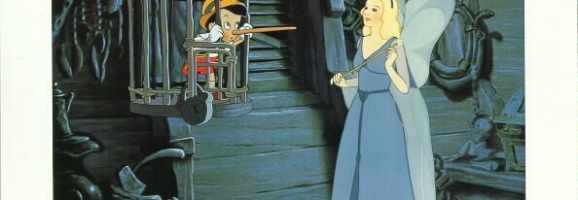
Thus far, the movie has been fine. No dark messages or meanings. By this point in Hunchback, a death has already happened. This scene, with its grey background and colored characters also marks the transition from bright colors earlier and simple problems to serious problems and dark demeanors. The next scene starts with Mr. Honest John and a new villain. A plump man in a red suit spills piles of gold provided Honest John gets him ‘stupid little boys’ to take to a place called ‘Pleasure Island,’ a place John implies is illegal, fearing the law might come after them. But the Coachman insists there is no risk because…
“They never come back as boys.”
This scene alone is screaming of dark, implicit messages a child might never understand. Later, there are explicit messages dark enough for a child’s mind and darker for an adult’s mind. The Coachman lays out his plan to traffic stupid little boys. Taking children from one area to another completely cut off from civilization is child trafficking. He offers gold to his pawns who now seem completely terrified of him as he whispers his plan to traffic the kids off to a nice little place called Pleasure Island. Honest John was not nearly as terrified of Stromboli. The way that scene played out was a clear indication of the power of the wealthy and what they do.
Once again, Honest John lures Pinocchio into his clutches under even more false pretenses. He convinces him he is ill and tells him to take some time off at Pleasure Island. Labeled by the movie as one of the ‘stupid little boys’ the Coachman was after, Pinocchio takes him up on the offer. Unbeknownst to them, Jiminy follows him secretly. Things get absolutely crazy, even for a Disney movie here. The first glimpse of Pleasure Island is maddening. One wonders how adults let children watch this movie?
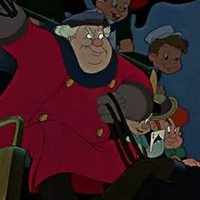
Pleasure Island is an amusement park where kids can do whatever they want. They can eat whatever they want, drink whatever they want, ice cream, dil pickles, beer, cigarettes, cigars, picking fights for the fun of it, destruction… all of them were mentioned explicitly.
“Smoke your heads off. There’s nobody here to stop you.”
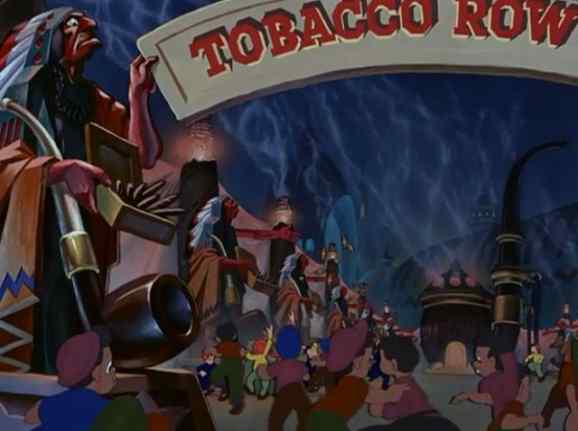
And behind these already dark explicit overtones the movie makes, it cleverly hides something darker, even for adults. The best way to hide something dark is to coat it with something dark. Seeing a dark coat makes many think that there is no need to look behind something already so explicit. But there is something notorious about the evil Coachman. He is not just some big wealthy guy who puts kids to work in salt mines after turning them to donkeys which apparently symbolizes their stupidity. He is also a pedophile.
We already established that the Coachman is responsible for illegal child trafficking, transporting them to a Fun land called Pleasure Island, (a word that many adults associate directly with sex) and luring them there with fun, candy, anything a kid could want. In one scene, just before the Coachman talks with a small donkey named Alexander, he stripped clothes off of another donkey? It was not directly dealt with but implicit messages rarely are. Earlier, he insisted there was no risk in illegally trafficking children to an island cut off from civilization because…
“They never come back. As BOYS!”
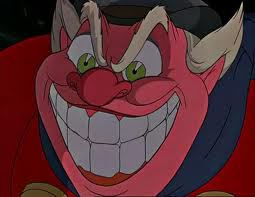
There are two possible meanings to these words. Both are important to think about and no one said they are mutually exclusive. One is explicit and means that that they leave and when they come back, they are donkeys incapable of speech. He even gets rid of the ones who can talk, those who inexplicably still retain the power of speech such as Alexander, and only God knows what happens to them. But behind the explicit meaning is yet another meaning. Once a boy is abused by a pedophile, they are no longer boys in the sense that their innocence has been violated. Pleasure Island violates their innocence badly. They drink, they smoke, they fight, they destroy stuff… and then they become donkeys and therefore, scarred for life. Pedophilia does tend to scar the victim for life. Pinocchio is the best example. He survived the torture and escaped before it got too bad but his ears and tail and even random bray still remained, he was ashamed to speak of it to his father, was scared of even mentioning it because he was scarred from the experience.
As he sits on the beach, recovering from his painful ordeal, he gets a message from a dove sent by none other than the Blue Fairy. It is never explicitly stated it was in fact her but it can be no one else. It certainly was not the entrapped Gepetto and the dove was glowing white which reminds us of a heavenly figure. The Blue Fairy. The one who promised she would never help him again. The fairy, who told Pinocchio not to lie, lied. And she sets many things in motion, thankfully she is benevolent. She informs him that Gepetto was swallowed by a whale named Monstro. After a brief reunion and a smart attempt to orchestrate an escape, Pinocchio is ultimately killed saving his father from the whale.
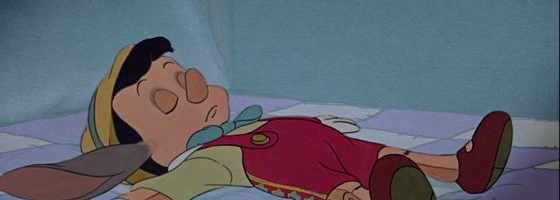
Killed. The first Disney main character who is definitely and certainly dead on-screen. The cat cries over his corpse, the fish, the cricket, Gepetto, the audience, everyone. We’re all miserable because Disney only ever had a character fall into an eternal sleep to be awakened by true love’s first kiss. Now, the half-donkey character is explicitly dead. The boy who was scarred from an experience was given a release from it and the movie seems set to take a tragic turn for the worst. Until… the Blue Fairy decides to resurrect him as a real boy, flesh and blood. Very benevolent on her part but it contradicts her promise to never help again. She is the definition of a Deus ex Machina. She is the solution to all problems presented: lifeless puppet, overgrown nose, locked cage, man-eating whale, or death. She is the benevolent solution and in so doing, provided Pinocchio with the rebirth he needed (notice his donkey ears and tail are gone) and he is set to live happily ever after.
But just him.
Pinocchio can live. The other boys… not so much. And this is where Pinocchio does what no Disney film has ever done and will ever do in the future, they allowed the tragedy to continue. All other Disney villains were punished accordingly, facing justice in one way or another. Pinocchio features more than one villain and they all got away with it. Only Pinocchio got through the ordeal. More unsuspecting kids will be taken away, the rest of the donkeys are set to work as slaves in the salt mines and that is just the ones who can not speak. The ones who still speak like that poor little Alexander (the one donkey in all of fiction that probably wrenches hearts just thinking about him), are unaccounted for.

We do not know what happens to them. But if the Coachman intends to keep them silent, the only way out is death. Even by the end, the Coachman is not punished, the donkeys are never freed and Stromboli is still out there to abuse other actors and actresses that come his way, Honest John and Gideon will continue luring stupid little boys into their traps, and that’s just how the world is. The Coachman got away with slavery and possible pedophilia and murder. So realistic, isn’t it?
Disney tends to give a happily ever after, not just for the main character but for the entire Kingdom it is set in, if not the world. Even Hunchback had the decency to give a showy happy ending with singing and dancing for all of Paris after the fiery, infernal battle with Judge Claude Frollo. Pinocchio is the one and only exception. The slaver, child-trafficker, pedophile, murderer, or all four is still out there and till now remains the only Disney villain to get away with what he did. And what he did is pretty terrible and tragic. Tragic enough when looked at on the surface, more so when one looks under the dark coat. Who could be called by some as the most truly evil Disney villain who caused massive and unrepaired damage got away with it. These days, if Disney even tried that, they’ll have the kids they so explicitly and implicitly insulted camping out in protest.
In conclusion, this movie is a truly a fantastic, dark work of art. The movie tells the biggest truth of them all, and in so doing lives up to its name. While all other Disney movies flaunt the lie that is happily ever after, Pinocchio gives it to the audience straight. Happily ever after only for some people. Not for everyone. And for those who do manage, it takes lies to get there. It takes pain, blood, sweat, tears and abuse before you get there and once you do, you are scarred. The rest… they are put to work like slaves and those who have even the capability to protest the conditions they are put in are silenced. The movie does a good job of hiding it because the darkest story ever told by Disney is covered with darkness itself. In the end, the only happy people are Pinocchio and Gepetto. Everyone else is miserable.
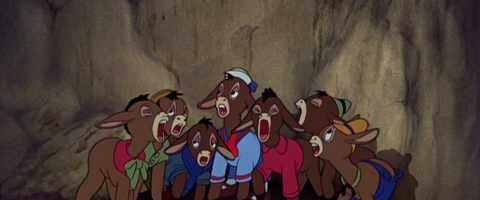
What do you think? Leave a comment.
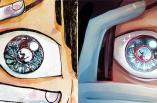
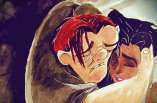
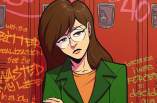

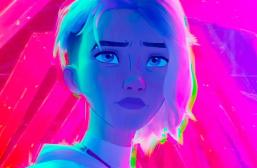
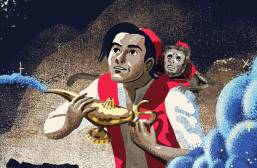
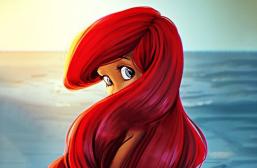
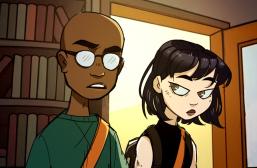
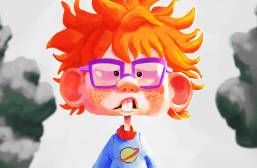

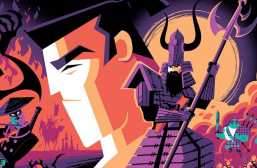
The funny thing about Pinocchio is that I didn’t see it until I was in my late teens despite having been in a production of Pinocchio (not the Disney version, but an adaptation of the story. I played a spooky clown at Pleasure Island) and having read the original Collodi tale. I always wondered how I would have viewed the film as a child.
I have friends who didn’t see the Hunchback till later too. But take it from someone who loved Pinocchio as a child (and still do as an adult) you don’t catch these things. They’re portrayed as bad things to do and if anything influenced me to be a good boy myself, lol. I have a real history with Pinocchio and I love the movie dearly.
Not one of the villains in this film gets what they have coming. They just get away with their actions. Honest John tricks Pinocchio… twice, Stromboli imprisons Pinoke, and The Coachman transforms boys into donkeys and sells them. Not one of them sees any retribution. Unusual for a Disney film, no? Usually the bad guy always gets it in the end.
Exactly my point. And you notice that Pinocchio also has it more difficult than other Disney protagonists in a certain way. Sure he doesn’t have to face a dragon but hey, at least Phillip was well equipped. Pinocchio has to face the world itself and needed to be rescued one too many times by the Fairy herself. Even the Fairy Godmother let Cinderella go it alone.
Yeah but think about it this way the story was not about defeating evil it was about staying away from it or if you do indulge in it consequences will follow. The same thing happened in the book as well. This is how most fairy tales played out in those days.
Yes, but see I’m speaking mainly about Disney films. Pinocchio is the only Disney movie to do this. Honestly, Tarzan was not really about defeating villains either and lo, Clayton still got the axe.
That’s just my take, but Pinocchio wasn’t raised. He was created from scratch and had no idea of what was right or wrong, so much that the blue fairy had to give him a separate conscience that was not even a part of his body (the cricket). So is it really right to say it was Pinocchio’s fault that he strayed towards “evil”? The boy had literally no idea what a school was before he was being sent to one. Of course, maybe “stay away from evil or face consequences” was really disney’s intention at that time and context, but NOWADAYS can we really say that? Can we really say that it’s a ~child~’s fault if something this dark happens to them and not the adult’s? I don’t really think so.
Yeah you can, everyone had to take responsibility for themselves and this is an archetype.
Just watched Pinocchio today and I totally agree with your assessment here- our grandparents read stories whose message was solely, “stay away” and “your decisions have “real serious consequences”
Pinocchio isn’t the only film that has the villain not getting his comeuppance. “It’s a Wonderful Life” also follows the same aesthetic with mean old Mr. Potter. He uses that rather underhanded tactic to try and ruin George Bailey, and in the end, it is the good will that George has showered on his family and friends that saves the day. I know on the IAWL board, there are threads that pop up wondering why Potter never received punishment.
Of course, it’s not the only film but it is the only Disney film to do so.
Technically Mister Potter, much like Titanic’s Cal Hockley, had implied defeats the film.
In Mr Potter’s case he was a frail old man in decline health-wise and in his power over his town.
In Carl Hockley’s case, he survived the sinking of the Titanic by sneaking on board a life boat bound for New York. The older Rose explains to the explorers that Cal Hockley eventually committed suicide in 1929 after the Wall Street Crash ruined whatever finances he had.
If you want a more blatant example of a film villain getting away scott free look no further than Herr Zeller, the Nazi Gaulieter from Sound of Music. Even though the Von Trapp family escape Occupied Austria, Herr Zeller is still maintaining Nazi order in Occupied Austria and indoctrinating innocent Austrians into the Nazi cause.
This, Hunchback of Notre Dame, Tarzan, and Atlantis are among Disney’s darkest films.
The Hunchback certainly. As for Tarzan and Atlantis… do tell. By all means. I am very interested.
I agree…. though I haven’t seen atlantis. Notre dame is so sad! However I think there is something a lot darker about the older disneys snow white for example, you wouldn’t catch someone trying to stab someones heart nowadays in Disney!
Good point. Taking a heart out… wow. I’ve heard of a broken heart but that was ridiculous. Early Disney films were seriously dark.
Yeah. And let’s not forget certain portions of Fantasia. I mean you really don’t see any of their films tackling the kind of stuff they did in the Night on Bald Mountain (Though Hunchback came pretty close.)
I haven’t seen this since I was a kid. I watched it recently and I forgot how dark it is! It’s all well and good that Pinocchio and company survived, but what about the hundreds of kids getting sold into donkey slavery? That part is really disturbing.
That’s exactly what gets to me as well. And honestly, the fates of those kids disturbed me even as a child but it was not until I became an adult when I realized how dire things were really were for them.
That part really disturbed me when I was little, I refused to watch it for years and I’d run out of the room or hide under the covers whenever my siblings would put it on and that scene would come on, I’d also have recurring nightmares about being turned into a donkey and being shoved into a crate sometimes along with my siblings and cousins.
The main point of the film is Pinocchio’s coming of age, learning from mistakes, saving his master, and finally becoming a boy.
Father more than master, really. But yes, in a way he did come of age. I should’ve added that. Good point.
Interesting article, gives me something to think about! I have not watched the film since I was young but I do remember being terrified and felt embarrassed and awkward when the Pleasure Island scene started. It is a brutally honest scene and I have never revisited the movie since. I have never evaluated the movie as an adult but I am not surprised that you’ve found some of the adult themes like human trafficking and pedophilia. I do think the Blue Fairy plays an important role here, she seems to be the mentor for Pinnochio. No matter what kind of mistakes he makes or what kind of choices he makes she is there to help guide him the best she can. I think that’s a very important role that is required for this movie, the world is a tough place to live sometimes but all we can do is roll with the punches and make the best of it.
Now you mention it, I remember being terrified too. Every time, even though I knew Pinocchio would escape because I watched it ten times, I prayed and prayed that Pinocchio would be ok. The Fairy is a very important god-like figure for him. Or, goddess. Her very direct role in giving him life and saving his life, as a sort of model of goodness despite all odds against him in the most dire of situations, he needed her desperately.
Please Island was very honest, open and direct with everyone, kids and adults alike. Kids found something to be scared of adults found something else, including but not limited to slavery and pedophilia.
I tried watching this movie as a teen, years ago. But I found it too “Dated”, and not entertaining enough for me.
I just watched it finally again: Wow, it’s really powerful! Well, first the flaws: it CAN be a little slow, particularly the scenes involving that Bad Fox and Stromboli… not that compelling. And it was kind of funny/lazy how a magical bird just sent a note to Pinocchio to tell him that Gepetto was swallowed by a whale, ha. That would not work in a contemporary movie, as continuity lol.
But the strengths… beautifully animated, with great opportunities for wonderful artwork: Gepetto’s workshop, the village, Pleasure Island, and the underwater scenes are quite beautiful.
I taught a Disney Films class last year and my students (18-adult) HATED Pinocchio and Dumbo with equal vigor. Yet the discussion was stifled because nobody could articulate quite why they had such dramatic reactions. One student simply stated, “This isn’t what Disney is all about,” which instigated a great conversation about audience expectations, brand, original material, etc. Anyway, I wish I’d had this analysis to give them a framework to understand what’s going on here! The sense of tragedy/loss/exploitation in Dumbo and injustice/darkness in Pinocchio drag viewers into affects they might not have expected in a Disney film. As you point out, many of the more recent films tie up all the loose ends or even offer perspectives that explain why “bad” behavior is a reaction to some other inequality (I’m thinking of Maleficent here). It’s an interesting piece of the Disney canon. I look forward to rewatching with your analysis in mind.
Thank you so much. It means a lot. I am quite surprised because I personally LOVE Pinocchio but I have a friend who does dislike it. I do find these types of discussions quite stimulating though. I envy your participation in such a discussion. I haven’t seen Maleficent yet but the idea does somewhat bother me. I’ll need to read a review or something because what I liked about rthe villain was her theatrical villainy. I didn’t need/want to know why she is evil. But your students were right about one thing. Pinocchio is a film that does stuff Disney never does. As for Dumbo, I don’t really remember it much but now you mention it, I forgot about Dumbo. An argument can be made that there is no villain in that movie though.
I would wager the entire circus (animal slavery) industry is high up on the scale of villainous activity.
I might also mention watching Dumbo as an adult.
I cried– more than I did during any other Disney film–as a child, later as a teenager, and even now as an adult. The injustices towards animals are as real and now as they were then.
It sounds like as though your students, weren’t knowledgeable of Disney. Even though, Disney is known for bright and cheerful movies, Disney is no stranger to the dark side. If I was teaching that class, I would’ve advised them to pay more attention to Disney’s other movies, because many of them have a fair share of dark content. I doubt your students really watched a lot of them. “This isn’t what Disney is about.” If my student said that, I would’ve told him, or her to watch ” The Watcher in the woods.”
this is precisely why old Disney movies were good and modern-day Disney movies are comparatively shit (bit harsh perhaps, but you get my point)
I really enjoyed reading your article. I especially enjoyed reading your discussion on how the Coachman lures boys, thus representing child trafficking. I never noticed the dark elements depicted in the film, but I’m glad you pointed them out!
I never noticed them myself until the last time I watched it about 3-4 years ago. Interestingly enough, it was my brother who pointed the pedophilia thing out but it took much more expansion than the Pleasure Island thing.
There’s the 1970’s Italian cartoon Un burattino di nome Pinocchio, it is very accurate to the book which is very dark the only part missing pretty much is where Pinocchio bites off the cat’s hand, the funny thing about it is Pinocchio looks like a girl his coat looks like a dress and he wears a pink bonnet.
Interesting. I never read the book. Pink bonnet? Maybe that was Italian style way back when?
This article is fascinating to me… I think with how long its been since I last watched Pinocchio I’ve managed to iron out the details into much brighter things in my head. Some of the movies from childhood are actually terrifying to revisit.. This was not one that would have popped into my head until now. Thank you for your thoughtful insight and analysis! You’ve given me quite a lot to think about!
My dad absolutely despises Pinocchio, in large part because it was such a dark film. In particular, he got mad at the scene that depicted the kids smoking cigars because when I saw it as a kid, I started picking up objects and pretended to smoke them. Other than that, he was also offended at how some of the shots of Pinocchio when he’s unconscious and lying in the water. They just looked so gruesome to be in a family/kids movie. It’s funny how that’s where he drew the line when so many other Disney films have equally dark elements. Personally, I never thought much of Pinocchio, but perhaps if I saw it again I could somehow appreciate the dark parts for being faithful to the dark nature of classic children’s stories a la the Brothers Grimm and Hans Christen Anderson.
Thanks for the nostalgia!
First of all, it has been a LOOONG time since I saw this movie because I really detested it. I detested feeling helpless in Pinocchio’s shoes.
When I was little this movie I always blamed Gepetto for not going back and saving all the other boys who had been turned into donkeys. Then I realized that they all must have had family too. The disturbing part is that these boys were rebels and troublemakers who resented their family–Pleasure island is all about indulging in those things parents restrict you from. And their family cannot protect them anymore because they willingly rejected that protection.
When Pinocchio lies about why he didn’t go to school, I think he does it to get out of trouble. So, saying that they were monsters is a lie because of the connotation and the deception behind it: Pinocchio wants to suggest coercion rather than the embarrassing truth of being tricked. When he says that he was put in a sack, rather than a cage, he once again loses responsibility because his sight is impaired. Including that Jiminy was caught too is his way of saying that his conscience was out of his reach–a way to completely avoid the blame that he anticipates from the Fairy. He wants to please her. IN a last ditch effort to appear the victim in the trail of events that he enjoyed up till the end while not going to school as he was told, Pinocchio lies about being chopped into fire wood–even though it is clear that he is whole. His growing nose makes it so that he cannot hide. It reveals his guilt and emphasizes the point that the original question was why he did not go to school. The lesson is that lying cannot protect you, and Pinocchio is destined to endure more dire situations when this becomes apparent.
I really like your points on Pinocchio and the other boys being “scarred” by their experience and that means they become donkeys. I also think it’s interesting that you bring up his death, although…. Can a wooden puppet die? Well, he returns to the form he once had, and rather than “helping him” against her word the fairy just fulfills her earlier promise. She isn’t bringing him back to life but rather rewarding him with life. She did not do this in the first place because perhaps she knew he was gullible and foolhardy and might die before actually enjoying life. Keeping him in the form of a wooden puppet, then, was a form of protection until he “came of age” as someone else said.
~Constellation
There is oone point to this story that is entirely missed altogether. Gepetto just sends Pinocchio, a new life, into the world without any advice or guidelines of what to avoid altogether.
Another thing to point out, in pleasure island the kids dont do anithing bad “per se” (except destruction), they gamble, play pool, drink and smoke. Those arent bad things (stay with me in this one), but things that you do when you are a grown up. You need the maturity and wisdom that come with age to be able to safely do all of those things, to gamble without being an addict, to drink without being an alcoholic, or… to have sex without being coerced. Again, this is all about the “they do not come back as BOYS”, is all about the scars that leaves an adult stealing away the innocence of a little boy.
I didnt like too much this movie, nor dumbo. Now everything makes sense.
Great article by the way
Thank you, really! This is very interesting. As a little kid I used to watch Pinocchio often, and I remember I didn’t find it (nor I did with Dumbo )so dark as Snowhite or The Sleeping Beauty, I only remember this strange feeling… like if I was watching something forbidden, too much harsh, bigger than me. Now, watching it again, and reading your article, I know the reason and the essence of those feelings 🙂 . We all are just little Pinocchios. (I’m sorry for my English LOL).
This is an interesting take on the film. I never quite noticed how awful the people around Pinocchio were.
Oh, they were the worst.
Good commentary and thorough analysis. However, I didn’t see any evidence that the coachman was a pedophile. I think he solely wanted to turn the boys into donkeys to sell them. Luring them with treats is characteristic of pedophiles, yes, but in this context it seems it was simply to turn them into donkeys so he could sell them. As for the ones who could still talk, I had thought- although I could be wrong- that he was just holding them there until they, too, lost their ability to speak.
Also, at the end, it seems everyone interprets Pinocchio as having died when I had thought it was just knocked unconscious or maybe a coma. I’ll be unhappy with Disney if he had actual death in mind here. But yes, the pleasure island sequence has often stuck out in my mind.
I have long detested Pinocchio because of its darkness. Also, I believe Pinocchio’s task is not just impossible because he is asked to do what other people can do – he is asked to do it without actually having a real conscience. He doesn’t really even understand right and wrong, that’s why Jiminy has to be assigned to him. How can Pinocchio be faulted for any of his choices when the Blue Fairy did not provide him with the tools he needed to make those choices.
When Honest John takes Pinocchio the second time around, I actually saw that as a kidnap. Sure he distracts him a lot with his doctor game but in the end he holds him against his will more than once and when they take him away it’s not willingly. Even if he would have wanted to escape, they wouldn’t have let him!!
So after reading this I think that, what’s actually even darker is that they can kidnap him again, just as easily after the movie ends and he resumes his life as a little defenseless kid.
I AGREE WITH YOU COMPLETELY ON EVERYTHING, ESPECIALLY OF THE VILLIANS. I WATCHED THIS MOVIE LAST NIGHT FOR THE FIRST TIME SINCE IN ALMOST 20 YEARS.. I’m 26 now.. and the movie freaked me out last night more than it did when I was a kid. I found it utterly disturbing, but still love it. there are so many subliminal messages in Disney movies, more so the older ones which is why they aren’t just for kids, but for adults too. children and even teens are so naïve and oblivious to life in general, not to mention Disney movies. there is way more symbolism and foreshadowing in these classics than we ever knew, making them very similar to George Orwell’s (animated) Animal Farm.. lol. which is also for adults, yet kids will enjoy too but in their own way- a much less understanding of why. Another important thing to add is The Blue fairy in Pinocchio is teaching him the lesson of life. And Disney is trying to teach little boys (and girls) the lesson of life AND TAKING RESPONSIBILITY for your own actions and not blame others, but be accountable. Pinocchio tries to blame Honest John saying he kidnapped him, when really Honest John wasn’t a very bright guy himself thus couldn’t take advantage of Pinoke IF he would’ve just said “no, I’m going to school and that’s final now leave me alone.” Blue Fairy was simply saying do not lie, do not blame others for your actions and when you misbehave. Now obviously all this what happened to Pinocchio was all ‘worst case scenario’ BUT it sort of prepares one for life on these things can happen. so be wise, listen to your conscience. follow your gut instinct, if something doesn’t feel right (Honest john, Stromboli, The Coachmen) etc, then it probably isn’t.. since Pinocchio didn’t have parents to upbring him with values, morals, etc. he only had this short time to prove himself. he got put into the world blindly and bluntly and got one too many curve balls thrown at him, such as life. now of course when you’re little you have no idea what the F is going on, but you just get scared. I will always love Disney movies.. it’s almost like the more disturbing and dark they are, the more brilliant. Walt Disney was indeed a genius. Great article by the way, I really enjoyed reading it 🙂
**I meant to say Pinocchio tries to blame Honest John and Stromboli to the blue Fairy.. sure they WERE monsters, but he was sort of saying nothing was his fault so he was lying and his nose grew. you know just like how kids do when they get in trouble they will try to blame their friend or the other guy, but they will learn quick they cannot do this and cannot snitch, for if they don’t learn to take responsibility as children they will have a hell of a time as adults. Remember the first time Honest John manipulates Pinoke and Jiminy for a second looks at the camera and goes “oh no! I need to go tell his father!!” then pauses and says “wait no, that would be snitching! i’ll handle this myself!” again I think an important message to take responsibility and don’t tell on someone… I would love to hear your response to this. thank! 🙂
sorry for my grammatical errors. I am reading over this and am thinking how embarrassing. that’s what I get for being sleep deprived.
I hated Pinocchio as a kid because of the donkey transformation scene. I cried whenever the Coachman came on the scene and was abusing the boys now turned into donkeys
Another movie I never liked was Bambi and I guess it was because Bambi’s mother dying offscreen never had an effect on me. There was a storybook of bambi I read with my grandmother as a child I still have which hinted the possibility she wasn’t dead it said something like the hunter had caught her and now Bambi was all alone
Just my two cents on the movie
Whoa. Nice Work! I haven’t watched Pinocchio since I was little but I’ll definitely have to revisit it now.
I agree that this movie is Disney’s darkest. I was always sensitive, and the thought of those boys, suddenly repentent and weeping “I want my momma!” just cut me to the heart. Who among us has not forgotten our good values at time, and just decided to indulge? Pinocchio may get second chances, but not these boys. There is no mercy for them, no one to help turn them onto the straight and narrow path. The movie almost implies that they are “good for nothing” and would only be a blight on society anyway– that they fully deserve the fate they get. Otherwise, the truth the viewer must face is too terrible.
All this seems even stranger when you consider that the movie’s most famous song, “When You Wish Upon A Star” is pretty much the unofficial anthem of the Disney company. A little clip of it plays in the “Disney Intro” (fireworks behind Cinderella Castle) shown before all movies made by Disney.
There’s a darker ending to the after film sequence. Gepetto is a weirdo and people probably know that. When he starts jabbering about a boy made of wood and is now his son he’ll likely get thrown into an asylum and pinocchio will end up in a workhouse.
Eh… if it is, it’s not part of the Disney movie. I never saw any such ending.
Powerful and revelatory excavation into the depth of the human condition, as only a master story teller could reveal guised as a fairytale.
Good essay, but I suggest you be more accurate when referring to things such as ‘pedophilia’. I think what you actually mean is child molestation/forced sex work. Pedophilia is a very stigmatized psychiatric disorder in which one feels sexual attraction to children. It is not necessarily the act of sexual behaviors with children. Many pedophiles never act on and go to great difficulties to overcome these attractions, and must face the status of assumed child molester that misuses of the term exactly like this create for them.
This is just sad. People see these things, yet continue to let their children watch
I also found Disney Wiki’s analysis of their own movie a bit of an interesting read, particularly this chunk:
“Origin–
In Italy, where the original story was written, the Donkey is a symbol of stupidity. The moral behind Pleasure Island (or “Toyland” as it was called in the original) is that little boys who scoff at education and moral codes set forth by their parents, preachers and authority figures and instead engage in “jackass” behavior such as fighting, vandalism and underage drinking are often destined to grow up to become men who have no option to make a living except through backbreaking manual labor. And there are plenty of people in the world, such as the Coachman, who will take advantage of that.”
OMG I hated this book…It was just a little-kid creepy vibe… Never saw the movie…. NOW I get it.
You HAVE to watch this lecture “Jordan Peterson – On Pinocchio”:
https://www.youtube.com/watch?v=3YhVruKGkjs
Enjoy!
I love this article. It makes me want to look at all those people who say, “Oh, Pinocchio is the sweetest little Disney classic” and say, “You’re new here, right?” Compared to the stuff you outlined here, Hunchback of Notre Dame is downright tame. Yes, Frollo was sex-obsessed, but at least he was explicit about it. That pedophile Coachman… *shudder*. By the way, I love the social commentary connected to the boys/donkeys at the end.
If you think acting is a foul career, than why the heck are you reviewing movies? Not only that but the characters were voiced by actors.
I forgot to mention that many celebrities, have made big bucks from acting, and many of them are extremely rich. You honestly don’t call that distinguished or successful? All that money they make is not successful?! That makes no sense. I mean I sort of get what you mean, but it’s not completely accurate.
I hated this movie as a kid. It made me feel sick and scared and sad. I saw it once and never wanted to see it again. ::::shudders:::: Now I get why!!
I watched this movie as a kid and watched it again today, many years later as an adult with my own child. Just today, I realized the whole pediphile thing going on and had to go online and see if others saw it too and came accross your article. Watching this movie as an adult, broke my heart. Your article says everything I felt. I hate the evil truth of this rotten world. That donkey part made me cry.
I think the Coachman’s comeuppance is that he eventually runs out of stupid little boys for his racket. Either that or his steamboat is unfortunate enough to be eaten by Monstro, a whale of a whale who has a reputation of eating ships whole.
There are stories about a deleted scene in which Honest John and Gideon meet Pinocchio for a third time but are arrested
Stromboli’s next show presumably flops without his star attraction.
I think the Coachman’s comeuppance is that he eventually runs out of stupid little boys for his racket. Either that or his steamboat is unfortunate enough to be eaten by Monstro, a whale of a whale who has a reputation of eating ships whole.
There are stories about a deleted scene in which Honest John and Gideon meet Pinocchio for a third time but are arrested
Stromboli’s next show presumably flops without his star attraction.
Monstro isn’t really a villain he’s just an animal looking for food.
I’m French and in my country, everybody knows the tale of Pinocchio but quite few people have seen the Disney movie, I think it’s in part because of the date when the film was released (1940, a time when American films were banned in Axis-ruled countries, as France in this time), and because all that dark stuff inside the film.
I’ve seen it for the first (and only) time at the age of 35, with my children, and I found it very dark and disturbing, perhaps more for the adults than for the children, and surely more than the original Italian novel (!) where most of the villains aren’t so bad (the “Mangiafuoco” = Stromboli, and a big shark instead of a whale) or are punished at the end (the fox and the cat, that finish their life in illness and misery), and where there aren’t any alcohol, tobacco or illicit behaviors in the land of toys / Pleasure Island (there are only toys).
I still wander how so much dark, violent and gruesome scenes could have been introduced in a Disney film for children and families, and more how could have been allowed in the Hays Code time, when were banned (or very controlled) for example violence against children and animals, sympathy for illicit behaviors, property damage, alcohol drinking (few years after the Prohibition time), drugs, fires, images of death, animal nudity (!)… Maybe (it’s a point of view that needs to be confirmed) showing moral decay and hellish punishments was seen as a way to divert people from misbehavioring, typical of the Puritan Anglo-saxon mentality and of course very strange (I add, twisted and perverse) for the French (and Latin/Catholic) one. I could compare it with a (softer) scene of Dumbo, when the baby elephant becomes sick and delirious after drinking a bucket of champagne.
I know it’s awful, but what can you do? Talk about dark; what about when Bambi’s mother is killed. Nothing is more devastating for a child than the loss of their mother. Shadows and light, shadows and light, just like life; you appreciate the light more when there are shadows ( I didn’t say darkness). So Disney got better at it (you still have to watch em) and you the viewer are better for it. I love these films in spite of their flaws; they have a lot and I mean a lot of “heart”.
Pinocchio came on the Disney channel today and I am literally here watching Pinocchio for the first time in years, with my five year old daughter. She is watching it for the first time. However, when the scene with the coachman came on I was shocked by the entire scene. I had to get online and check if anyone else felt it was inappropriate and hinted at child sex trafficking. I could not believe my eyes or ears; “pleasure island” “little boys that cut school” “they don’t come back as boys”. I am SHOCKED. wow wow wow. I guess as a kid I wouldn’t catch the almost blatant meaning, but I am amazed that this scene is in a child’s movie.
Pinocchio is one of my favorite Disney movies, because it has a lot of life lessons in it. Pinocchio could’ve easily went to school and still face many challenges. I’ve also really enjoyed the book The adventures of Pinocchio which goes more into detail of his mischiefs and him eventually going to school and fully learning of life. Though Disney’s version only tells some of his adventures I appreciate their trueness to the story. There’s also a 1970 animated version which is really good.
I would argue that Beauty and the Beast is the only recent Disney film that comes close to allowing a villain to “walk” in the same way as Pinocchio – by which I’m referring to Monsieur D’Arque, probably the only truly “evil” villain in the movie (even the scenes in which Coachman and D’Arque are introduced are strikingly similar, with both men being presented as the personifications of evil). Whereas the Beast, Gaston, the villagers, the Enchantress, and the rabid wolves all have some logical motivations for their actions, the Asylum owner is a corrupt, sadistic official who clearly derives pleasure in torturing people that society has ostracized as “crazy” or different.
He’ll even lock away people he knows aren’t really “crazy” for money (and he “loves it”). And anyone who knows what insane asylums were like in the late 1700s into the early 1800s (the time that the film is presumably set) know that they were more like hellish prisons than they were places to seek treatment, with inmates treated like caged dying animals. And this system would continue for well over a century, long after the basic BatB story would be resolved.
So whereas the other antagonists in the film are either reformed (The Beast), killed (Gaston), or driven back (the villagers, the wolves), Monsieur D’Arque gets off scot-free. We don’t see him in the angry mob after Maurice’s sanity is proved, nor in the fleeing masses from the castle, so presumably he’s allowed to continue running his Asylum and persecuting/torturing “crazy” inmates to his heart’s content. With that understanding its hard not to come away thinking “you can’t change the whole world” – not unlike Pinocchio.
Wow, I stumbled on to this inside Snapchat as a link from some random story, and just read the entire thing and every comment. You wrote an amazing piece with loads of substance.
I haven’t seen Pinocchio since I was probably 8 and I’m 37 now but it’s surprising how I instantly recollected the scenes you were describing. I do remember feeling really disturbed by the Pleasure Island scene and the traumatic donkey phase. Now I have a much better understanding why.
Your chilling and accurate review breaks Dark Disney down so well. Thank you for that. I would like an opinion, if it can be still be offered, on the following; I have read a synopsis of the original Pinocchio Adventures book and that version did not end well nor is Pinocchio ever redeemable or redeemed. Gepetto is the victim and his puppet is the villian from beginning to end. It is a dark tragedy with zero phony moralizing. I’ve actually been thinking that original Pinocchio and the many dark fairytale devices (the cat, fox, cricket etc.) mirror the current President (not my president!) his voter base, his Administration, the Republican Congress and the, soon to swing radically to the right, SCOTUS. Can you draw any similar parallels. I’ve taken to calling POTUS President Pinocchio. Looking forward to your reply!
I appreciate most of your thoughts and praise of the art of the film. There is nothing wrong with Disney’s optimism and idealism in other films. And in this film, the main characters prosper by way of goodness and faith. Also, as a child I was horrified of the donkey scene and it still til this day watching it years later meant a general visceral nightmare —painting a picture of a specific crime is outside the realm of what’s shown. But either way it definitely is dark and scary as hell in a motivating way. Its very possible I never got into smoking because of how haunting this movie is.
Lastly, it’s important to note that neither Disney nor the protagonists kill the “villain” in films such as Snow White. The Witch dies of her own accord by slipping. Vengence is an old testament outdated solution. Films like Pinocchio and Snow White feature in my opinion a new testament concept of faith in which the protagonist is not burdened with the obligation to imprison kill or punish the antagonist, but solely to try and be good.
There was many villains in Dumbo. Multiple. The circus exploiting him..the people making fun.
The people who took his mother away. You could say the same of bambi..people are the villains
I remember seeing this movie as a boy… and I remember knowing how dark it was. I came away from it feeling sick.
I did not know about Jews then, but I know now.
Basically, anything Jews come up with is designed to unseat order in the universe, from Pinocchio to compound interest and nuclear weapons.
Never trust them or expose yourself to their works if you value your soul and your joy for living. They will take everything you cherish and rip it apart.
Insightful, super analysis taking into account phenomena in the world. I watched this movie for the first time since my childhood and man, so many implicit dark meanings you only understand as an adult. Like you said, the movie seems dark to a child, but even more dark to an adult.
It would have also been fascinating to read some analysis about the themes of responsibility and accountability which are some key themes of Pinocchio. Good stuff
Stromboli’s lost forever his “little wooden gold mine” obtaining much less success than before,probably bankrupt and depressed. Honest John and Gideon continue their miserable lives in the Village based on misery,petty crimes,stupidity,illiteration,going in and outta the prison,incapable to fool Pinocchio now a real and responsible boy and they wasted the opportunity to exploit his unique “ability” of being a living,talking and stringless wooden puppet and without sense of value for money(just listen the song “HONEST JOHN”). Monstro probably died or it’s simply “damaged”,but certainly has lost the opportunity to kill Pinocchio and Geppetto and hurts himself. The Coachman may be got away unpunished,but after Pinocchio’s escape has probably interrupted his business on Pleasure Island. Satisfied,now? Ah,and pedophilia has a whole(or all)different meaning!
*HE’S simply “damaged”…
Honest John is not so terrified of Stromboli because this last one has shown his true nature to no one but Pinocchio,Monstro as a whale behaving in contrast with his nature is,according to Disney,the evil in the body of an animali, that’s why is a whale and not a shark or dogfish like in the Collodi’s book. Foulfellow and Gideon have their comeuppance from the beginning and earlier because they never went to school,they do petty crimes like stupid cons,little thefts and cheats, they have problems with law and authorities on a daily basis, they are stupid and illiterate guys,they live in misery and have a strage idea of theirs about “plenty of money”,and they get swindled by other and more bad and smart guys. They waste unique than rare chances and they wear the same ripped and ruined clothes.
There is a late radio-song of the movie called “Honest John”. You can hear it briefly in Tobacco Row sequence,in Pleasure Island.
Lampwick would have been the successor of Honest John. Every character is a perfect rapresentation to show better the moral of the story. Must be analyzed much more than any other film. Beautiful!
I’m delighted to have found an article in which it’s writer agrees with my view of this movie. My husband and I watched this movie last night for the first time and we’re both horrifed.
I think they will find a way home to there parents house
I also think that the donkeys with escape from the coachman and return back into boys.
Punishment for evil doers need no be explicitly observed ,for there is just compensation that we all must face.
fantastic analysis.
I was just talking about the undertones in this movie to my wife, did not know if I was the only one who thought this way. Turns out I’m not crazy.
“Pleasure Island” is both a confession and a boast.
We know of Little St. James and Jeffrey Epstein, there are many more we will soon discover. The scourge of satanist pedophilia and ritual sacrifice is on the precipice of being obliterated from our planet. Thank you for seeing the underlying depravity and writing this illuminating exposE.
Nothing Can Stop What is Coming.
Where We Go One, We Go All
This is the exact article I was looking for. When I was watching this film, I was haunted by the eerie ideas and highly-alluded plotline. The question is, do we as a society blame those who have been lured by temptations?
I would say that this is rather accurate in its analysis of Pinocchio. Also, as someone that had a dad that was a child at around the time that Pinocchio was made into a movie, the vices portrayed (particularly in the cities) were disturbingly common to children.
That was fascinating so many ties to current times I also saw recently that Pinocchio also stands for the pineal gland or consciousness and ocular Pinocchio! Seems that they were telling us all along.
Pinocchio was never made for children; it was made for adults; and adults just don’t get it.
We are all Avatars existing in a vexing computer dream world to generate negative emotional enegry for lower 4th dimensional entities.
Prove you are human, type cats in singular form below:
Singular… plural… past tense… present tense… future tense… few know this anymore.
Thank you for your article.
Row, row, row your boat; gently down the stream. Merrily, merrily merrily merrily… LIFE IS BUT A DREAM.
Are you getting it now?
DId you guys notice that at pleasure island you can tear down a house? That house looks exactly like the white house? Like the capitol riots?
Thanks. This was right on. But another way to see it is as a satire on the life of Christ. And it is a wicked one. Geppetto is Joseph. Wood? Think about that one. Jiminy? John eh? The BLUE fairy? Think of the Madonna statues.They mixed the whale up from the old testament but everyone mixes the two up anyway. Herod? Think about that one. Now I’ll venture into the fire – look at the imagery of the ears/nose etc. and look at the imagery of the Jews in 1930. I could go on. It’s darker than you think.
Actually, I think the reason Pinocchio is afraid to speak to his father about how the donkey ears and tail happened is because they were a result of Pinocchio going where he wasn’t supposed to. If you read the origins of why Sesame Street ended the gag of the adults not believing Big Bird about Snuffy, it implies that most kids would WANT TO tell their parents about an experience they were scarred from, because the gag was making kids think that nobody would believe them when they were telling the truth (which Pinocchio promised earlier in the movie to always do).
Also, if you watched the movie and notice Jiminy Cricket warning Pinocchio not to go and find Geppetto, as well as Geppetto saying “You shouldn’t have come down here”, those are implications that Pinocchio was supposed to go to the Coast Guard and tell what happened to Geppetto, and they would have gone to get Geppetto out of Monstro the whale, which would be enough to have Pinocchio transformed into a human.
I also read in a storybook of this movie that came from an overstock store that Geppetto was on his way to Pleasure Island when he was swallowed by Monstro the whale (I would assume it was because the Blue Fairy told Geppetto where Pinocchio was and Geppetto was out to pull Pinocchio off).
I also think the ending of Pinocchio was supposed to depict reincarnation-the belief that when you die, the soul is reborn in another bodily form-in this case, Pinocchio’s first life was as an anthropomorphic wooden boy, and he came back as a real human.
The reason for him to die in the end may have been intended to replicate the transformation from a caterpillar to a butterfly-the death of Pinocchio is probably supposed to be like a butterfly in its chrysalis.
People think Monstro’s scary because he’s big enough to swallow the Titanic whole. Coachman is the real MVP on the villain side.
A few thoughts here. I think Pinocchio is a coming of age story where the main point is to take the path of virtue, lest you live to learn life lessons the hard way.. through your own mistakes.
You see, everything the Blue Fairy tell Pinocchio is true. She initially tests Pinocchio with her establishing conditions:
“Prove yourself brave, truthful and unselfish, and someday you will be a real boy.”
“And always let your conscience be your guide.”
Of course, being a new boy without the benefit of tutelage, he falls short of his one directive the whole movie: Go to school to learn. Naturally, he is first easily fooled by Honest John, but don’t forget… Jimmy warned him against going with John and told him exactly what to say to get out of the situation. Pinocchio ignored Jimmy, his conscience, and unfortunately learned his lesson the hard way and is locked in jail.
The Blue Fairy, probably expecting something like this to happen, comes back to aid him, then offers him a chance to tell the truth. Jiminy, again, encourages him to simply be truthful. Ignoring his conscience again, Pinocchio attempts to deceive Blue Fairy with half-truths..escalating to blatant lies. Notice, Jiminy interjects before Pinocchio tells full lies… asking him to leave him out of it. After all, by that point in the recollection, Pinocchio had ignored his conscience. The Fairy teaches him a lesson in the importance of being virtuous, which begins with honesty with ones self. At this point, Pinocchio has enough experience to know how to move forward on his own.
Enter the Pleasure Island arc. Here, Pinocchio should know from past experience that Honest John cannot be trusted. Yet he goes along with his story… leading him to the nightmare that is pleasure island. After reuniting with Jiminy, his conscience, he is then aided by a bird that’s associated with Blue Fairy. Technically, she does not provide the solution to his problem… but rather the ultimate opportunity to prove himself.
At this point, Pinocchio uses his past experiences to aid him in saving his father, demonstrating bravery, honesty and unselfishness in the endeavor. As a result, he satisfies the conditions for boyhood… and, being true to her word, the Blue Fairy delivers on her promise.
I’m a real boy. Only because I survived all the lies told to him by believing in the only truth available to me.. myself. Then trust is/was developed. The lies always intuitively tell on themselves. Then and only then through talking about them do they both become reality and truth implicitly dependant upon one another.
Incredible analyzis. Spot-on and reminiscent of multiple pedo cases that happens recently (Epstein for ex.). Thank you.